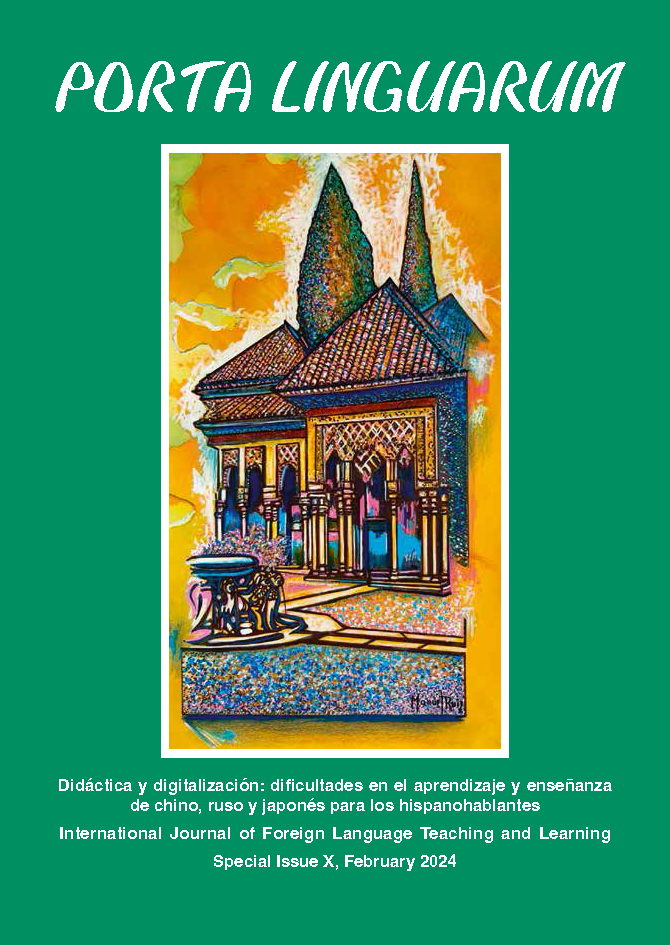Improvement of communicative, inquiry and digital competencies with the use of ICT while learning phraseology in Russian classes
DOI:
https://doi.org/10.30827/portalin.viX.27944Keywords:
phraseology, teaching, FL, ICT, Russian as a foreign language, competenciesAbstract
The emergence of ICT in the current landscape has had a huge impact on the field of education in recent years, especially in language teaching. This digital teaching approach has gained momentum since students are the protagonists of their own learning process. This change implies a renewal of the methodological approach to foreign language teaching. This study aims to provide an overview of the impact of phraseology teaching in classes of Russian as a foreign language with the use of ICT on the acquisition of communicative, inquiry and digital competencies of the participants of the present study carried out at the Russian Center. For the analysis of the data of this intervention, a qualitative study was designed through the use of the reflective diary as a data collection tool to evaluate the achievement of these competencies. The results show that, although teaching phraseology can be challenging for students, it favors the development of different communicative subcompetencies, inquiry competence, and digital competence.
Downloads
References
Alessandro, A. (2011). Investigación en la acción educativa. Las unidades fraseológicas pragmáticas en la didáctica del español y del italiano como lenguas extranjeras. [Tesis doctoral, Universidad de Murcia]. Repositorio institucional de la Universidad de Murcia http://hdl.handle.net/10803/83822.
Alfageme, M. (2007). El portafolio reflexivo: Metodología didáctica en el EEES. Educación. Siglo XXI, 25, 209–226.
Brady, I.K., Tomás Cámara, D. & Sánchez Muñoz, A. R. (2019). Desarrollar la competencia comunicativa e intercultural en lengua inglesa mediante un estudio de campo con residentes extranjeros en España. Docencia e investigación: revista de la Escuela Universitaria de Magisterio de Toledo, 30, 33-52.
Consejo de Europa. (2001). Common European Framework of Reference for Languages: Learning, Teaching, Assessment. Press Syndicate of the University of Cambridge.
Diccionario fraseológico ilustrativo. Extraído de https://www.fraze.ru
Estándar Estatal de ruso como lengua extranjera. Tercer nivel. Dominio general (1999). Ivanova, T.A. et al. Moscú-San Petersburgo: Zlatoust.
Ettinger, S. (2008). Alcances e límites da fraseodidáctica. Diez preguntas clave sobre estado actual da investigación, Cadernos de Fraseoloxía Galega, 10, 95-127.
Flick, U. (2018). Managing Quality in Qualitative Research. SAGE.
García, F., Portillo., J., Romo, J. & Benito, M. (2007). “Nativos digitales y modelos de aprendizaje”, Actas del IV Simposio Pluridisciplinar sobre Diseño, Evaluación y Desarrollo de Contenido Educativos Reutilizables (SPDECE07). Retrieved 20 September 2022 from https://ceur-ws.org/Vol-318/Garcia.pdf
Gbrich, C. (2007). Qualitative Data Analysis: An Introduction, 1st ed.; SAGE.
Manual de léxico mínimo de ruso como lengua extranjera. Tercer nivel. Dominio general. (2019). Andryushina, N.P. et al. San Petersburgo: Zlatoust.
Koch, P., Oesterreicher, W. (1985). Sprache der Nähe — Sprache der Distanz. Mündlichkeit und Schriftlichkeit im Spannungsfeld von Sprachtheorie und Sprachgeschichte. Romanistisches Jahrbuch, 36. https://doi.org/10.1515/9783110244922.15
Mellado Blanco, C. (2012). Optimización de los recursos TIC en la fraseología del par de lenguas alemán-español. In M.I. González Rey (Ed.), Unidades fraseológicas y TIC (pp. 147-166). Instituto Cervantes.
Montoro del Arco, E. T. (2003). La manipulación humorística de las expresiones fijas como medio de para la enseñanza de fraseología del español. In J.A. Moya Corral & M.A. Montoya Ramírez (Eds.), Variación lingüística y enseñanza de la lengua española. Actas de las VIII Jornadas sobre la enseñanza de la lengua española (pp. 329-342). Universida de Granada.
Mura, G.A. (2018). Fraseología y fraseodidáctica digitales en E/LE. Normas, 8, 248-258. DOI: https://doi.org/10.7203/Normas.v8i1.13434
Nuñez Román, F. (2015). Enseñar fraseología: consideraciones sobre la fraseodidáctica del español. Didáctica. Lengua y Literatura, 27, 153-166. https://doi.org/10.5209/rev_DIDA.2015.v27.51295
Rodríguez Pérez, N. & Heinsch, B. (2021). El impacto de la digitalización en la competencia comunicativa en lenguas extranjeras en la Educación Superior. RELATEC (Revista Latinoamericana de Tecnología Educativa), 20(1), 71-85. https://doi.org/10.17398/1695-288X.20.1.71
Solano Rodríguez, M. A. (2007): «El papel de la conciencia fraseológica en la enseñanza y aprendizaje de una lengua extranjera». En M.ª Isabel González Rey (Ed.), Les expressions figées en didactique des langues étrangères (pp. 201-221). Cortil-Wodon: E.M.E.
Solano Rodríguez, M. A. (2012). Fraseodidáctica basada en tecnologías digitales. In M.I. González Rey (Ed.), Unidades fraseológicas y TIC (pp. 167-186). Instituto Cervantes.
Souza, M.C.; Ferreira, S.; Cruz; & Gomes, R. (2017). Investigación Social. Teoría, Método y Creatividad. Lugar Editorial.
Sparker, A.C. (2005). Narrative Analysis: Exploring the Whats and Hows of Personal Stories. En Qualitative Research in Health Care, 1st ed.; Holloway, I., Ed.; Open University Press.
Suárez González, A., Cea Álvarez, A. M. & Araújo, S. (2021). Estrategias de aprendizaje y competencia digital en la adquisición de léxico en lenguas próximas. Linred: Lingüística en la Red, 18.
Sursock, A. (2015). Trend: Learning and Teaching in European Universities. European University Association. Retrieved 10 December 2022 from https://tinyurl.com/y8ndxtfp
Szyndler, A. (2015). La fraseología en el aula de E/LE: ¿un reto difícil de alcanzar? Una aproximación a la fraseodidáctica. Didáctica. Lengua y Literatura, 27, 197-216. https://doi.org/10.5209/rev_DIDA.2015.v27.50867
Timofeeva Timofeev, L. (2012). Sobre la traducción fraseológica. ELUA, 26, 405-432.
Timofeeva Timofeev, L. (2013). La fraseología en la clase de lengua extranjera: ¿misión imposible? ONOMÁZEIN, 28, 320-336. DOI: https://doi.org/10.7764/onomazein.28.17
Tizón Quinteiro, M. del A. (2020). La enseñanza de fraseología en ELE a partir de las TIC. Trabajo Fin de Grado. Universidade da Coruña.
Vinogradov, V.V. (1972). Russskii jazyk (Lengua rusa). Vysshaja shkola.
Zuluaga, A. (2001). Análisis y traducción de las UF desautomatizadas. PhiN, 16, 67-83.



















